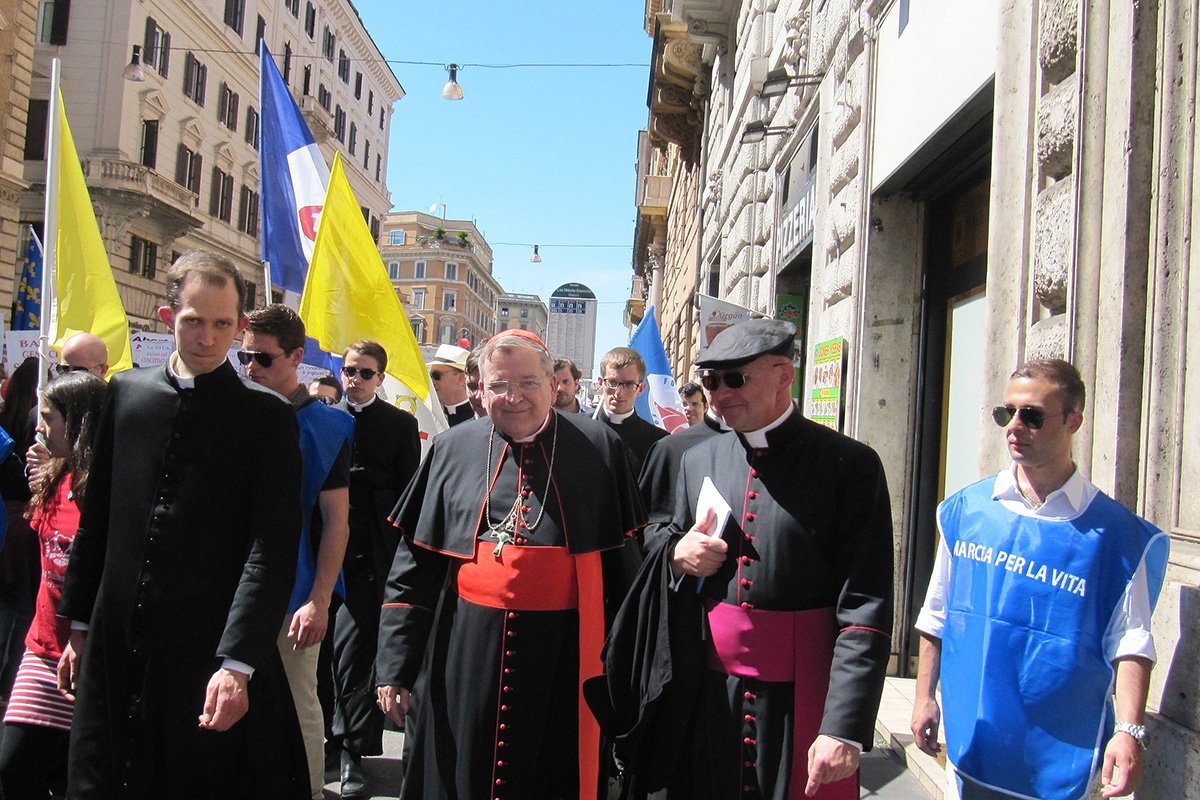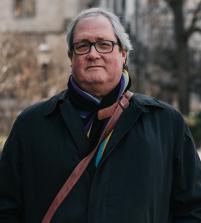
The Cardinal and His Popes
The tension between Cardinal Burke and Pope Francis offers a window into the state of Roman Catholicism in the world and American religion.
His Eminence Raymond Leo Cardinal Burke is in the news again due to recent reports that Pope Francis has decided to charge Cardinal Burke rent for his Vatican apartment and to remove his salary. As of this writing neither the Pope’s officials nor the Cardinal himself has confirmed the reports, but a consensus has emerged that such action has been taken.
Gentle readers should always be suspicious of the media’s love of a sensational story. In this case, however, the story seems credible – and merits note. The tension between the Cardinal and the current pontiff affords a window into an odd conjunction: the state of Roman Catholicism in the world, and an increasingly important center of gravity in American religion.
A respected canon lawyer and a pastorally successful priest in LaCrosse, Wisconsin, then-Bishop Burke vaulted into the national spotlight in 2004 when he urged priests to deny the Holy Eucharist to Senator and Democratic presidential candidate John Kerry. His pronouncement “went viral” at the time and arguably signaled the ascension of what are now called “the radical traditionalists,” American Catholics who lament the Second Vatican Council. That set of reforms, inaugurated in the 1960s, included liturgy in the vernacular, ecumenical relations with other faiths, and enhanced roles for laity, especially women, in Church life and governance.
Pope Benedict XVI was favorably disposed to Burke, and appointed him as prefect of the Apostolic Signatura (the Church’s version of a Supreme Court), and then to the Congregation for Bishops (responsible for recommending episcopal candidates to the Pope). In 2010, Benedict elevated Burke to the rank of Cardinal.
Perhaps unsurprisingly, Pope Francis reversed this arc of ascension. In 2013, the year of his election to the pontificate, Francis did not renew Cardinal Burke’s appointment to the Congregation of Bishops. In 2014, he removed Burke from the prefect of the Apostolic Signatura, and then appointed Burke to the largely ceremonial role of cardinal patron of the Sovereign Knights of Malta.
This spin of his ecclesial Wheel of Fortune has prompted Cardinal Burke to take his perspective extra ecclesia. In various public forums, Burke has questioned Francis’s authority to limit the use of the Traditional Latin Mass, expressed concern about the expanding role of women in the Church and the degree to which it jeopardizes the Church’s “manliness,” reiterated the need to link distribution of the Eucharist to abortion politics, and made common cause with Steve Bannon to assert historic and contemporary links between the Islamic faith and terrorism. Recently, Burke effectively mocked Francis’s Synod of Synodality with a litany of criticisms of Francis’ papacy and his fears for the fate of the church in the modern world. The most trenchant speculation about the reported removal of Burke’s salary is that Francis was advised that Burke’s act was too brazen to be ignored.
This pas de deux prompts several observations.
First, journalistic accounts of the immediate story and of Burke’s past criticisms of Francis typically describe it as a contestation of the legacy of the Second Vatican Council. Cardinal Burke himself also frames it in this way. In fact, however, their disagreement is the latest chapter in a larger legacy, namely, the difficulty of the Roman Catholic Church over the past century and a half to settle its mind about its relation to “the modern world.” Vatican II reversed the arc of the teaching of Vatican I: where modernity had been “anathema,” it was now to be engaged dialogically.
A more accurate frame would present Cardinal Burke as representing the sensibility of Vatican I and Pope Francis that of Vatican II. Specifically, the synodal consultations that Francis regards as prerequisite to Church governance can only, in Burke’s view, sew confusion and misunderstanding among the faithful. Much of the energy in this encounter results from the fact that Burke recognizes more clearly than even many of Francis’s advocates that the current Pope has embraced with more than a little vigor the second Council’s attitude toward modernity. Whatever one’s judgment of Cardinal Burke’s dogmatic position or his tactics, he is astute in this assessment. Francis’s advocates should not allow their concern for the slow pace of reform to blind them to a radicality of purpose that has alarmed the Pope’s antagonist-in-chief. This is the bifurcated state of Roman Catholicism in the world today.
It is also a signal point for a shift in the center of gravity in American religion. It is no accident that Cardinal Burke is counted as first among equals in a group of American cardinals who, with a few exceptions, share Burke’s concern about the corrosions of modernity. With his turn to the public to air his grievances, Burke has become the de facto leader of a conservative coalition that can be seen on display in both the composition and in several recent decisions of the United States Supreme Court. It is also influential to a significant substratum of the Republican party that readily makes common cause with the Cardinal on the preeminence of abortion as the central issue of the nation’s politics.
Speaking of America’s Protestant heritage, G.K. Chesterton reportedly remarked that America is “a nation with the soul of a church.” Cardinal Burke’s actions and their uniform effects both within Catholicism and within the United States suggest that the soul Chesterton invoked – and which has been shifting for some time – includes a road to Rome.
Featured image: Cardinal Burke in a 2015 March for Life in Rome. Photo by HazteOir.org, used under the Creative Commons Attribution Share-Alike 2.0 Generic License.


